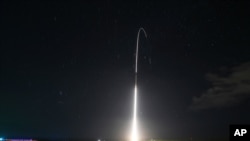Efforts to rein in a potential nuclear arms race and the weaponization of outer space will be high on the United States agenda at an upcoming United Nations disarmament meeting. A hybrid meeting of the U.N. General Assembly First Committee, which deals with disarmament issues, will be held as part of the UNGA session in New York between October 6 and November 6.
Over the last 10 years, the United States reportedly has been trying to lessen the need for nuclear weapons as part of its strategic doctrine.
U.S. Ambassador to the Conference on Disarmament in Geneva, Robert Wood, says these efforts have not been matched by Russia and China. If this continues, he said, the U.S. will have to confront and respond to these two giant hegemonic, authoritarian powers.
“One of the things we are trying to do is to bring not only Russia to the table, but also China—to have a tri-lateral arms negotiation, to deal with not only strategic nuclear weapons, but non-strategic nuclear weapons, new systems that Russia is developing, because we think this is the direction we are going in the future,” he said.
Wood said both Russia and China are boosting their nuclear capabilities, and the United States will have to respond to that. He said China, which is the third largest nuclear power in the world, is expected to double its program over the next decade.
The U.S. ambassador said another area of concern is the potential weaponization of outer space and cyberspace by Russia and China. He said both governments have submitted a draft treaty to the Conference on Disarmament to ban weapons in outer space. He said that Washington opposes the so-called Prevention of the Placement of Weapons in Outer Space, or PPWT, because it is not possible to verify such a treaty.
"I think China and Russia pushing the PPWT is nothing more than propaganda for them. I do not think they have any interest in adhering to or implementing any kind of PPWT.… It is a really serious threat to, not just the United States’ way of life, but also other countries’ way of life,” he said.
Wood said both Russia and China are continuing to develop anti-satellite systems that threaten the peaceful commercial use of outer space and also the many daily activities upon which nations around the world depend.
Wood is calling on Russia and China to sit down with the U.S. and other nations to develop some norms upon which all can agree.




